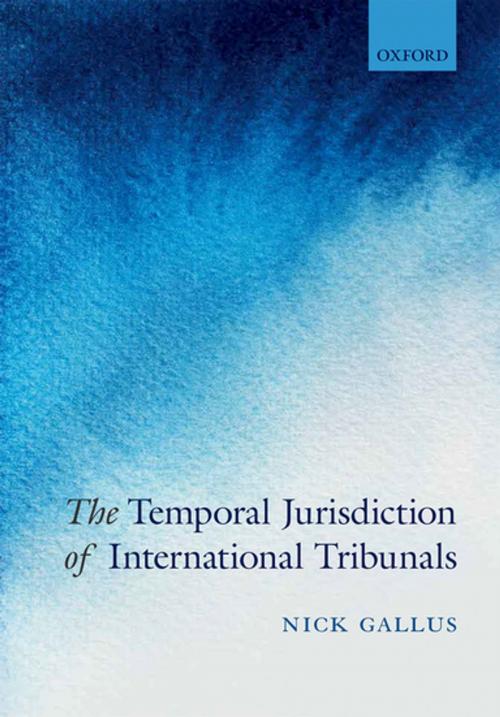The Temporal Jurisdiction of International Tribunals
Nonfiction, Reference & Language, Law, Arbitration, Negotiation, & Mediation, International| Author: | Nick Gallus | ISBN: | 9780192509406 |
| Publisher: | OUP Oxford | Publication: | May 11, 2017 |
| Imprint: | OUP Oxford | Language: | English |
| Author: | Nick Gallus |
| ISBN: | 9780192509406 |
| Publisher: | OUP Oxford |
| Publication: | May 11, 2017 |
| Imprint: | OUP Oxford |
| Language: | English |
The period of an international tribunal's temporal jurisdiction is the span of time during which an act must have occurred before the tribunal may consider if the act breached an obligation. There are many questions concerning this particular aspect of an international tribunal's jurisdiction: Does a tribunal have power over acts that occurred after the entry into force of the obligation allegedly breached, but before the tribunal's jurisdiction was accepted? What about acts that began before the tribunal's jurisdiction was accepted but continued after? To what extent can acts before the period of the tribunal's jurisdiction affect its decision on whether or not there is a breach through acts afterwards? The Temporal Jurisdiction of International Tribunals examines these questions in depth. Despite its importance, the temporal jurisdiction of international tribunals is not well understood. Tribunals often confuse different aspects of their jurisdiction and refuse to hear cases they should have heard, or agree to hear cases they should not. This book reduces this confusion by clarifying the different limits on the temporal jurisdiction of international tribunals and the important distinctions between those limits. The book examines the temporal limits resulting from (i) the entry into force of the obligation supposedly breached, (ii) the acceptance of the tribunal's jurisdiction, and (iii) from the period of limitation, as well as the effect of acts that occurred before these limits. Throughout the book, the author comprehensively compares decisions from a wide variety of sources, including the International Court of Justice, Human Rights Courts, World Trade Organization panels, and investment treaty tribunals. It comments on decisions that arose from some of the most notorious events of the twentieth century, including the "Katyn Massacre" of the Second World War, the 1994 Rwandan genocide, and the "forced disappearance" of American political opponents. It reviews these decisions and identifies common principles that help define the temporal jurisdiction of tribunals to decide breaches of international law. This book is essential for anyone practicing in international law, and anyone building a case that could be affected by temporal jurisdiction.
The period of an international tribunal's temporal jurisdiction is the span of time during which an act must have occurred before the tribunal may consider if the act breached an obligation. There are many questions concerning this particular aspect of an international tribunal's jurisdiction: Does a tribunal have power over acts that occurred after the entry into force of the obligation allegedly breached, but before the tribunal's jurisdiction was accepted? What about acts that began before the tribunal's jurisdiction was accepted but continued after? To what extent can acts before the period of the tribunal's jurisdiction affect its decision on whether or not there is a breach through acts afterwards? The Temporal Jurisdiction of International Tribunals examines these questions in depth. Despite its importance, the temporal jurisdiction of international tribunals is not well understood. Tribunals often confuse different aspects of their jurisdiction and refuse to hear cases they should have heard, or agree to hear cases they should not. This book reduces this confusion by clarifying the different limits on the temporal jurisdiction of international tribunals and the important distinctions between those limits. The book examines the temporal limits resulting from (i) the entry into force of the obligation supposedly breached, (ii) the acceptance of the tribunal's jurisdiction, and (iii) from the period of limitation, as well as the effect of acts that occurred before these limits. Throughout the book, the author comprehensively compares decisions from a wide variety of sources, including the International Court of Justice, Human Rights Courts, World Trade Organization panels, and investment treaty tribunals. It comments on decisions that arose from some of the most notorious events of the twentieth century, including the "Katyn Massacre" of the Second World War, the 1994 Rwandan genocide, and the "forced disappearance" of American political opponents. It reviews these decisions and identifies common principles that help define the temporal jurisdiction of tribunals to decide breaches of international law. This book is essential for anyone practicing in international law, and anyone building a case that could be affected by temporal jurisdiction.















